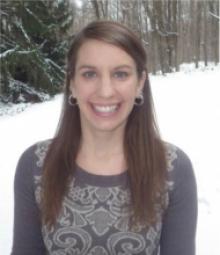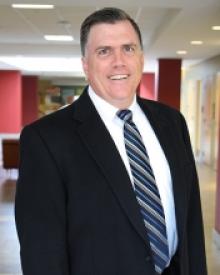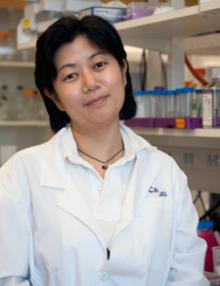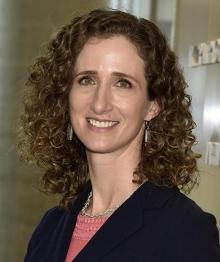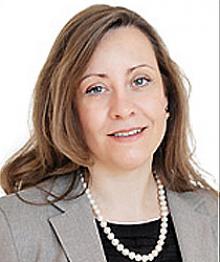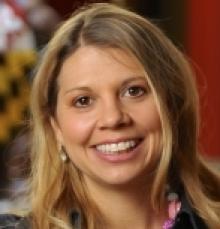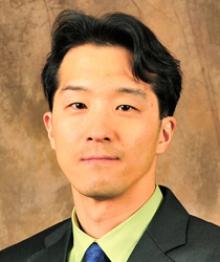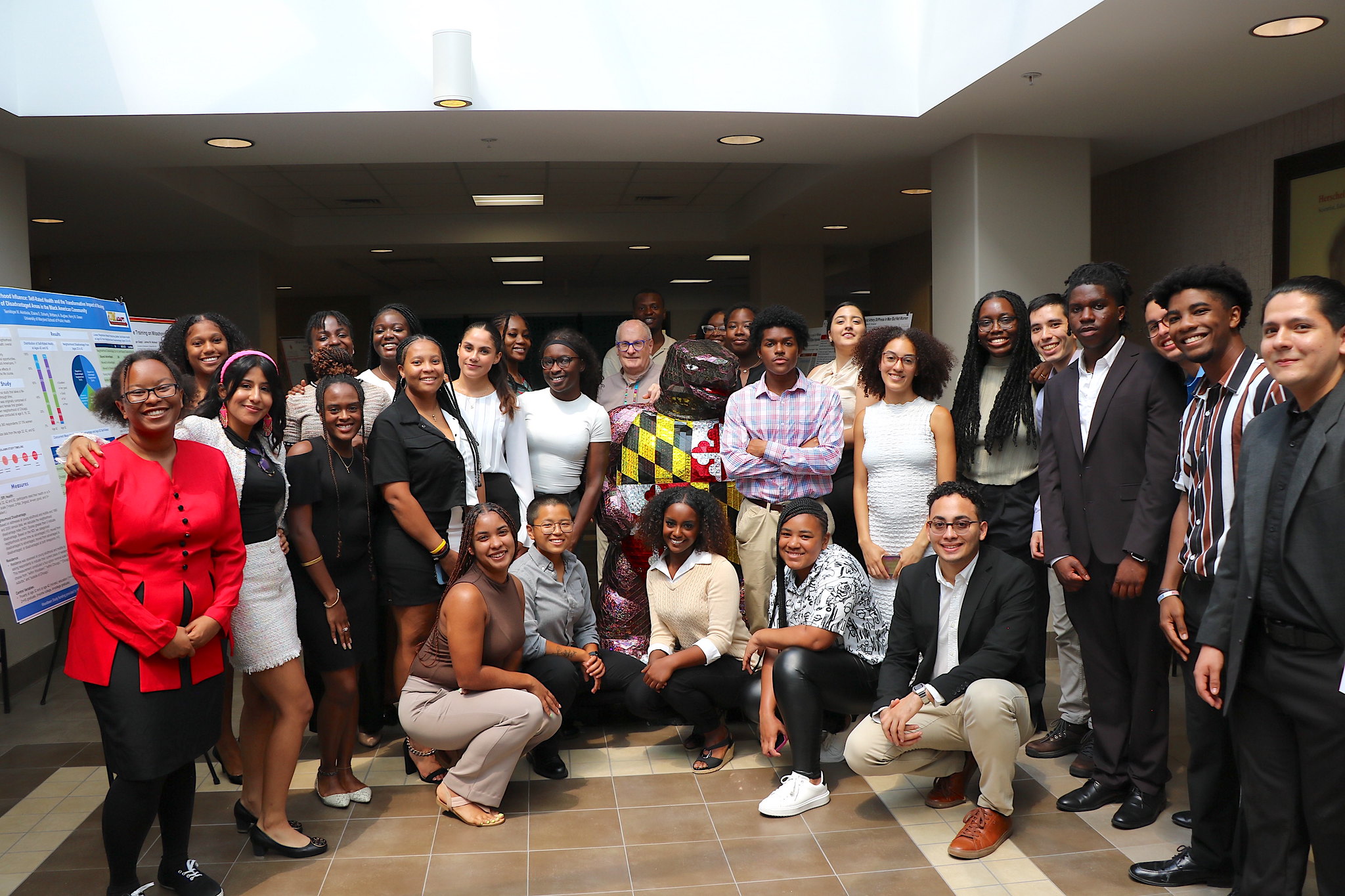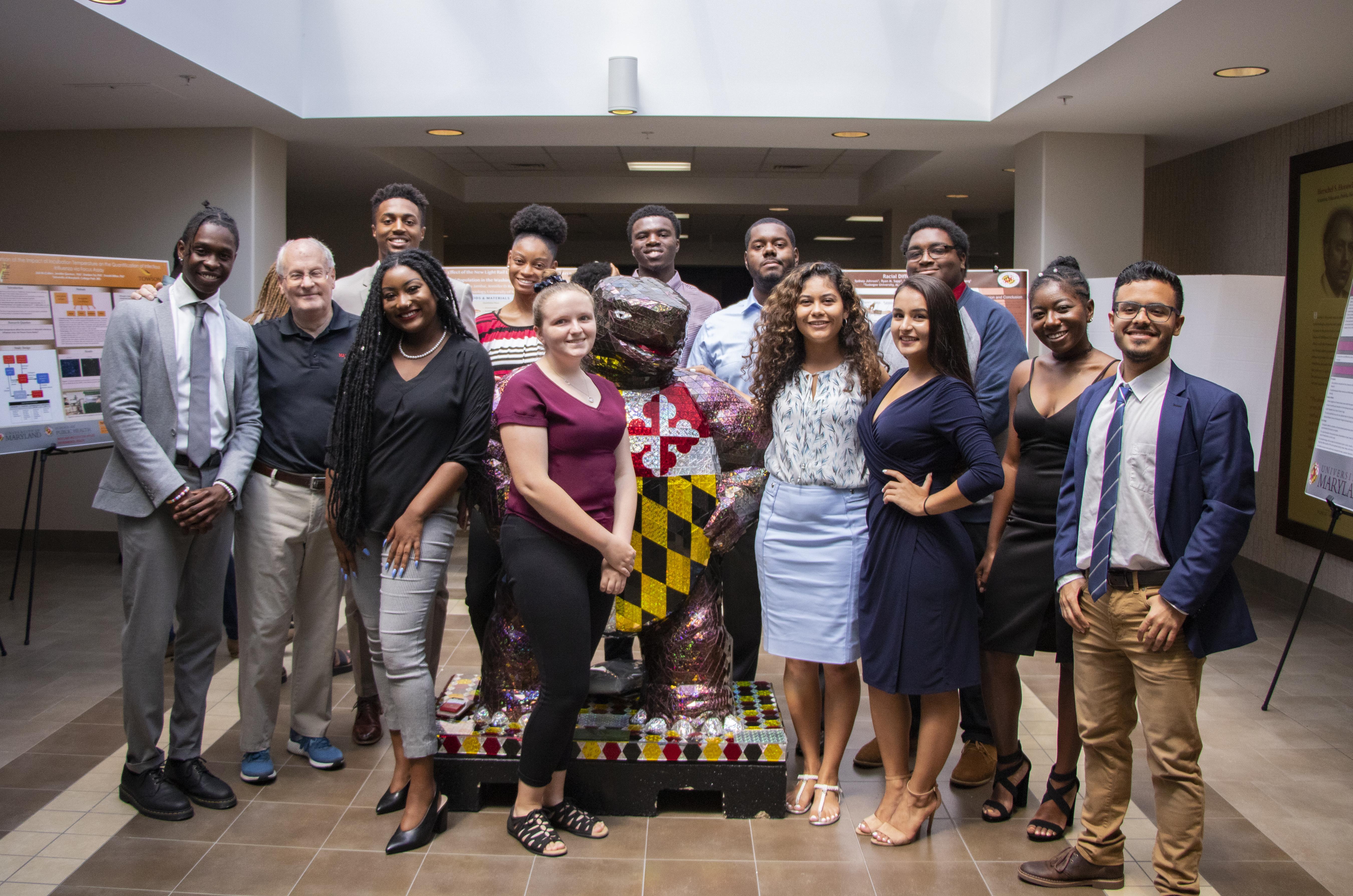
The University of Maryland School of Public Health Summer Training and Research (STAR) program is designed to provide traditionally underrepresented and disadvantaged undergraduate students with two consecutive summers of a 10-week research training and career development program to enhance their potential to apply for and complete PhD degrees in biomedical and behavioral science relevant to preventing and treating cardiovascular disease. To be eligible for this program you can be an undergraduate student at any university or you can be from the University of Maryland College Park. If you are from the University of Maryland, College Park, you are also eligible for our similar UM ADAPT Program. UM STAR has been funded since 2008 by a grant from the National Heart, Lung, and Blood Institute (NHLBI) of the National Institutes of Health (NIH). Dozens of UM STAR trainees have completed the program to date and the program enrolls six-eight new trainees every summer.
The Specific Objectives of the UM STAR Program are to:
- Enhance research skills and experience necessary to be competitive graduate school applicants in cardiovascular and related disease research areas
- Enhance awareness of the process, practice, and ethics underlying scientific research
- Prepare trainees for graduate school and a research career
- Provide quality mentoring
- Increase knowledge of landmark and breakthrough research on the causes and prevention of cardiovascular and related diseases
- Have Fun!
Application Information
The goal of the UM STAR program is that all trainees will be supported for two consecutive summers in the program. We very strongly believe that 2 consecutive summers in the UM STAR program will significantly enhance the Trainee’s experience and maximize their potential for successfully completing a PhD degree in a biomedical or behavioral discipline related to the treatment and prevention of cardiovascular or related diseases.
- Citizen or permanent resident of the US;
- Enrolled full-time at a 4-year college or university;
- Currently a sophomore or junior
- Have not already completed a Bachelor’s degree;
- 3.0 or better cumulative grade point average;
- Come from an under-represented minority group, disadvantaged background, and/or have a disability
- Under-represented minority: African American or black, Hispanic/Latino, Native American or Pacific Islander
- Disadvantaged background: First-generation college student within the immediate family
- Disability: Physical or mental impairment that substantially limits one or more major life activities
- Desire to pursue a PhD in biomedical or behavioral sciences;
- Willing to commit to the program for 2 consecutive summers.
Each candidate’s application materials will be reviewed by the UM STAR Admissions Committee based on the following criteria:
- the candidate’s desire to pursue a PhD degree
- the candidate’s Personal Statement
- undergraduate GPA, especially in science-based courses
- letters of reference
- a rising sophomore or a junior
- the diversity they add to the applicant pool
- the mentors they have selected
To apply for UM STAR, please submit:
- Completed Application Form
- Official Undergraduate Transcript (original)
- One-Page Personal Statement (see additional information) a letter of application which must address: must address:
- why they selected the UM STAR program
- their long-term career goals, especially with regard to graduate school and pursuing a PhD degree
- which three UM STAR program faculty mentors they have selected and why
- Two Letters of Recommendation (both from faculty members, with one being a professor who had you in a behavioral, life, or biological science course).
This material must be submitted on-line at the Big Ten Academic Alliance Summer Research Opportunities Program (SROP) Application site.
The deadline to complete the online application is February 10, 2024. The site usually opens for applications on November 1, 2023.
Note: Transcripts and recommendations will be accepted on the on-line site until MARCH 1. Please allow 10 days' processing time once transcripts arrive at the SROP office for the transcript status on SROP applications to be updated.
Further questions can be addressed to James Hagberg, PhD (hagberg@umd.edu).
| Date | Activity |
|---|---|
| February 10, 2024 | Deadline to Complete Online Applications |
| March 1, 2024 | Deadline to Submit Letters of Reference and Transcripts |
| Early March 2024 | UM STAR Admissions Committee meets to review applicants |
| April 1, 2024 | Letters Offering Positions sent to candidates |
| April 15, 2024 | Signed acceptance letters due back from candidates |
| May 1, 2024 | Initial contacts between UM STAR Trainees and Mentors |
| June 3 - August 9, 2024 | UM STAR summer program session dates |
Training Activities
Once a Trainee has been accepted into the program, their Mentor will make initial contact by email and/or telephone to begin to develop the research project that the Trainee will complete during the summer. It is expected that this project will be somewhat finalized prior to the Trainee arriving at UM for the summer program. The faculty Mentors will meet with each of their trainees every Friday during the summer to assess progress over the last week, to establish research goals for the upcoming week, and to “troubleshoot” any problems that have developed. These progress reports and goals are necessary for the Trainee to present and discuss at the Monday Research Updates. One prerequisite for a faculty Mentor to accept a UM STAR Trainee is that the faculty Mentor agrees to spend the appropriate amount of time necessary to ensure a successful research experience for the UM STAR Trainee.
Trainees are expected to spend a full 40 hours each week directly involved in their summer research project with a substantial amount of this time spent in their Mentor's research laboratory. Trainees may work more directly and on a much more frequent basis with graduate students and other laboratory personnel in their Mentor's laboratory.
All UM STAR trainees, the two Co-Directors, and at least two faculty Mentors will meet every Monday for 1 hr with lunch provided. Each Trainee will present a ~5 minute summary of their research progress over the past week with ~5 minutes of discussion from other Trainees, Co-Directors, and Mentors. The goal of this interaction is to have Trainees review their own progress and set goals for the upcoming week, and for other Trainees and faculty involved with the program to assess their progress on a weekly basis and help them to set realistic and achievable goals for the upcoming week.
All UM STAR Trainees and a visiting guest meet informally every Wednesday for 1 hr with lunch provided. In the past we have had Department Chairs within the School of Public Health and the Dean and various Associate Deams of the School of Public Helath as guests for these sessions. Graduate students who participate in these sessions will be selected to provide a wide range of backgrounds including ethnicity/race, gender, career goals, and laboratory background. In this session virtually any question can be raised and discussed. Issues that might be discussed would be: how did you decide on a research career, how did you select a program and a specific professor as your major advisor, what should a person look for in selecting a program or major advisor, among others.
All STAR Trainees and the Co-Directors will attend this session, which is meant to develop the ability of UM STAR Trainees to understand, critique, and present published articles related to biomedical and behavioral aspects of cardiovascular disease. Lunch will also be provided to enhance attendance by faculty and students. Two articles will be presented during each week of Journal Club. In the first week, the articles will be presented by the Co-Directors to provide the Trainees with model presentations. In the remaining 4 weeks, Trainees will present the Journal Club articles with the assistance of their faculty and graduate student mentors. The papers presented will be selected from a list generated by the Co-Directors to represent classic papers in the areas related to the research of the faculty mentors.
Sample Journal Club Articles
Keys A. Coronary heart disease in seven countries. Circulation Supp. 1970; I186-I195.
Ross R, Glomset JA. The pathogenesis of atherosclerosis. N Engl J Med 1976; 295:369-377, 420-425.
Ross, R. Atherosclerosis – an inflammatory disease. N Engl J Med 1999; 340:115-126.
Sytkowski PA, Kannel WB, D’Agostino. Changes in risk factors and the decline in mortality from cardiovascular disease. The Framingham Heart Study. N Engl J Med 1990; 322:1635-1641.
The Lipid Research Clinics Coronary Primary Prevention Trial Results I. Reduction in incidence of coronary heart disease. JAMA 1984; 251:351-364.
Blair SN, Kohl HW, III, Paffenbarger RS, Jr, Clark DG, Cooper KH, Gibbons LW. Physical fitness and all-cause mortality. A prospective study of healthy men and women. JAMA 1989; 262:2395-2401.
Klein S, Burke LE, Bray GA et al. Clinical implications of obesity with specific focus on cardiovascular disease: A statement for professionals from the American Heart Association Council on Nutrition, Physical Activity, and Metabolism: endorsed by the American College of Cardiology Foundation. Circulation 2004;110:2952.
Appel LJ, Moore TJ, Obarzanek E, et al. A clinical trial of the effects of diet patterns on blood pressure: DASH Collaborative Research Group. N Engl J Med. 1997; 336: 1117–1122.
Rossouw JE, Anderson GL, Prentice RL, et al. Risks and benefits of estrogen plus progestin in healthy postmenopausal women: principal results from the Women’s Health Initiative randomized controlled trial. JAMA. 2002; 288: 321–333.
Pai JK, Pischon T, Ma J, et al. Inflammatory markers and the risk of coronary heart disease in men and women. New Engl J Med 2004; 351:2599-2610.
Research-Related Training for first-year trainees is designed to enhance their knowledge of the process, practice, and ethics of biomedical and behavioral research. It will introduce the trainees to a range of critical issues related to research including ethics, human research, animal research, scientific misconduct, and appropriate scientific practices. Trainees will complete the on-line Human Participant Protection Education for Research Teams course during the program.
Introduction to Research: This session is designed to inform the trainees about the different definitions and forms of research, especially as they have evolved over time. The goal is for the trainees to understand that the term “research” is not static and that it varies over time and disciplines.
Introduction to Human Research and IRBs: This session will address the evolution and current status of human subjects research protection and will address such issues as the Tuskegee study, the Belmont Report, the Office of Human Research Protections, and the recent Kennedy-Krieger case in Maryland.
Introduction to Animal Research and IACUC: This session will address the principles and legislation that regulate the humane use of animals in research laboratories. Trainees will also become familiar with the American Association for Laboratory Animal Science (AALAS) web site and will complete one of the on-line AALAS training programs.
Scientific Record Keeping and Data Management: Trainees will learn about expectations for record-keeping, its purposes, how to ensure participant confidentiality, different types of record keeping, and how data management systems work, among other topics. Students will be shown examples of study protocols and manuals of procedures.
Scientific Misconduct and the Office of Research Integrity: A case study will be used to highlight important issues surrounding scientific misconduct. This session will cover the Eric Poehlmann case from the beginning to the end to alert the trainees to the overriding issues that may result in scientific misconduct.
Authorship: Trainees will be instructed as to the requirements for inclusion as an author on a published scientific paper. Readings for this session will include the general guidelines used by a number of scientific journals relative to authorship and a number of articles that directly address and discuss the issue of authorship.
Conflict of Interest: Prior to this session, trainees will conduct a web-based search to identify the different types of conflicts of interests, find examples of conflict of interest policies (NIH and others), how real or perceived conflicts may jeopardize objectivity, and what types of conflicts are disclosed for different scientific-related activities. A recent review article suggesting that funding source can influence study outcomes will be a reading assignment (Lesser LI, Ebbeling CB, Goozner M, Wypij D, Ludwig DS. Relationship between funding source and conclusion among nutrition-related scientific articles. PLoS Med. 2007 Jan 9;4(1):e5 [Epub ahead of print]).
Open Discussion/Topics of Interest: During the first 9 weeks of this program the trainees will be constantly reminded and questioned about any additional research-related training topics that they would be especially interested in discussing in the last week. Given their stated interests and career goals, we fully expect that it will not be difficult to generate one or two additional Research-Related Training topics. The Co-Directors, with the assistance of second-year trainees, will develop and present this session with appropriate readings being available prior to the session.
This component is designed for second-year trainees to significantly advance their career development and to prepare them for the next steps in their careers. As such, this component primarily focuses on issues related to graduate school, such as mentoring, development of a Curriculum Vita, preparing for graduate school, GRE preparation, graduate school admission process, selecting a graduate school and advisor, and research and academic careers. One session will also be dedicated to Mock Graduate School Interviews.
Given the large number of scientific and cultural resources in the immediate area of UM, each summer the Trainees, the Co-Directors, and Mentors will visit additional sites to enhance the Trainees’ scientific and cultural development. These visits could include: NIH, USDA, and Smithsonian scientific laboratories, a behind-the-scenes tour of the National Zoo, Annapolis and the US Naval Academy, the White House, Senate, House of Representatives, or the Chesapeake Bay Foundation. We have personal contacts at the NIH, USDA, Smithsonian, Chesapeake Bay Foundation, and National Zoo. One summer the UM STAR faculty and Trainees visited the National Library of Congress, the National Library of Medicine at NIH, and a trip to the Baltimore Aquarium and Baltimore Orioles game.
At the end of the summer UM STAR program, each trainee will make a 10-minute oral PowerPoint presentation similar to what would take place at a national scientific meeting summarizing their summer research project. In addition, there will also be a UM STAR Poster Session, where each trainee will prepare and present a poster summarizing their summer’s work, results, and conclusions. The Dean of the School of Public Health, all Department Chairs, and UM STAR faculty mentors will attend this session; other faculty members and graduate students in the School of Public Health will be encouraged to also attend.
Program Staff and Mentors
Program Director
James Hagberg, PhD
Professor, Department of Kinesiology, University of Maryland School of Public Health
Professor of Medicine, Epidemiology and Public Health, University of Maryland School of Medicine
Email: hagberg@umd.edu
James Hagberg, PhD
Professor – Departments of Kinesiology, Medicine, Public Health and Epidemiology
Dr. James Hagberg's previous research assessed the genetics of CVD risk factor responses to exercise training in sedentary older men and women. He maintains a database of CV fitness, plasma lipoprotein lipids, body composition, bone density, glucose tolerance, insulin sensitivity, and inflammatory, coagulation, and fibrinolysis measures from before and after a standardized six-month exercise intervention in ~200 older men and women from this study. This database contains ~40 genotypes, numerous phenotypes, and banked plasma and DNA samples for these individuals. Trainees could analyze new relationships among the genotype and phenotype data, or they could measure new phenotypes in the plasma samples or genotype new polymorphisms in the DNA samples. More recently, Dr. Hagberg has studied the effects of exercise and lack of exercise on circulating angiogenic cells, adult stem cells that have regenerative capacities within the CV system, in middle- to older-aged healthy individuals and clinical populations. Dr. Hagberg has a long history of mentoring as the major advisor for 16 PhD and 20 masters students. He and his lab mentored numerous trainees in the first ten years of the UM STAR program and the first five years of the UM ADAPT Program.
Sarah Glancy, PhD
Assistant Professor – Department of Kinesiology
Dr. Sarah Glancy earned her PhD from Arizona State University in 2012 in Exercise Biochemistry and joined the faculty of the University of Maryland Department of Kinesiology in 2017. She studies cardiac mitochondrial energy production matching to energy demand. i.e. how cardiac muscle cells increase ATP production at the onset of exercise. She is funded by the American Heart Association to investigate how the cellular milieu affects energy production in cardiac mitochondria in an animal model of heart failure with preserved left ventricular ejection fraction. Trainees could participate in bench research, performing experiments measuring calcium uptake in heart mitochondria. Dr. Glancy is currently funded via an American Heart Association Career Development Award titled" Matching Myocardial Energy Supply to Increases in Demand: Altered Calcium Action in Heart Failure. "Dr. Glancy has mentored a number of undergraduate and graduate students during her graduate school and postdoctoral training.
Steven Jay, PhD
Assistant Professor – Department of BioEngineering
Dr. Steven Jay earned his biomedical engineering PhD from Yale University in 2009 and then completed postdoctoral training at Harvard/MIT. His laboratory develops rationally-designed therapeutic biotechnologies involving exosomes, other extracellular vesicles and engineered proteins. A driving force behind his work is to translate discoveries and innovations into clinical therapies. He currently collaborates with Dr. Hagberg to examine the effects of exercise on endothelial function to enhance therapeutic vascularization. Dr. Jay's research is currently funded by an NIH/NHLBI RO1 titled "Controlling Exosome Noncoding RNA Cargo for Enhanced Wound Healing." Dr. Jay also directs an honors undergraduate student team that is investigating similar mechanisms to potentially treat osteoarthritis and has mentored a number of masters and PhD students.
Steven Prior, PhD
Assistant Professor – Department of Kinesiology
Dr. Steven Prior earned his PhD in kinesiology from the University of Maryland and then rejoined the UM faculty in 2017. He has published 30 scientific papers. Dr. Prior studies the mechanisms by which the risk for age-associated cardiometabolic diseases, functional deficits and associated vascular impairments are improved in older adults with exercise training. These studies include cardiometabolic and functional phenotyping, as well as skeletal muscle and plasma samples in ~70 older adults. Trainees could analyze relationships among novel disease predictors and cardiometabolic phenotypes or assay samples for novel targets. Dr. Prior's research is currently funded by an NIH/NIA R21 grant titled "Neuromuscular Rehabilitation to Improve Function in Older Adults with PAD," which though funded through NIA clearly is primarily focused on the CV system, angiogenesis and CV disease risk factors. He has mentored a number of graduate students, as well as six postdoctoral fellows and junior faculty members.
Sushant Ranadive, PhD
Assistant Professor – Department of Kinesiology
Dr. Sushant Ranadive earned his PhD in exercise physiology from the University of Illinois and completed postdoctoral training at the Mayo Clinic. He joined the University of Maryland faculty in 2017. He has 41 publications on vascular function and exercise training in postmenopausal women and sex differences in vascular function, inflammation and oxidative stress. Trainees can participate in data collection and analyses for these projects. Dr. Ranadive's research is currently funded by a UM internal grant to assess "Racial Differences in Vascular Function Following Induced Acute Inflammation." Dr. Ranadive has mentored a high school student, three undergraduate students, one medical student and one MD-PhD student previously at the Mayo Clinic.
J. Carson Smith, PhD
Associate Professor – Department of Kinesiology
Dr. J. Carson Smith earned his PhD in 2000 in exercise science from the University of Georgia and completed postdoctoral training at the University of Florida in psychophysiology. He joined the University of Maryland faculty in 2011 and has 40 publications. His lab studies the efficacy of physical activity in improving metabolic health and brain function and structure, as measured by MRI, in older adults at increased risk for Alzheimer's disease. He has studied the effects of exercise on cerebral blood flow using arterial spin labeling and brain activation using functional MRI. Dr. Smith's research is currently funded by an NIH/NIA RO1 titled "Exercise for Brain Health with Increased Genetic Risk for Alzheimer's Disease," which is a large exercise intervention trial assessing blood brain flow. He has mentored a number of graduate and undergraduate students and has mentored five UM STAR Trainees.
Kan Cao, PhD
Associate Professor – Department of Cell and Molecular Biology
Dr. Kan Cao received her PhD in Biology from Johns Hopkins University in 2005 and then completed postdoctoral training in genomics at NIH with Francis Collins. Dr. Cao was named a New Scholar in Aging by the Ellison Medical Foundation in 2011. She studies molecular and cellular mechanisms underlying Hutchinson Gilford progeria syndrome (HGPS), a rare premature aging disease. Roughly 90 percent of HGPS cases are caused by a de novo mutation in the lamin A gene which causes life-threatening CVD in HGPS patients. Previous research has shown a profound and massive loss of smooth muscle cells in large arteries in both human patients and HGPS mouse models, strongly suggesting a connection of this phenotype with the CV malfunction and death associated with HGPS. The primary goal of her laboratory is to elucidate the molecular pathway behind this phenotype. To investigate this question, her laboratory applies a suite of techniques from cell biology, stem cell biology, to genomics. Her current collaborators include Drs. Francis Collins (NIH/NHGRI) and Richard Hodes (NIH/NIA). Her research is funded by two NIH/NHLBI RO1 awards. Dr. Cao has a long history of mentoring, serving as an advisor for eight PhD students, five postdoctoral fellows, and ten undergraduate students.
Jonathan Dinman, PhD
Professor, Department of Cell and Molecular Biology
Dr. Jonathan Dinman received his PhD from the Johns Hopkins School of Public Health in Immunology and Infectious Diseases in 1988 and then completed postdoctoral training and was a Senior Staff Fellow at NIDDK in Virology. He joined the University of Maryland faculty in 2002. His research focuses on understanding the causes and impacts of defects in the DNA translational apparatus. He is a leader in the field of translational recoding, having pioneered genetics, biochemical and biophysical analyses of how cis-acting elements on mRNAs interact with ribosomes to alter the readout of the genetic code. One aspect of his research is focused on ribosomopathies. These are genetic diseases that paradoxically present initially as pathologies caused by too few cells, e.g. anemias, followed by those caused by too many cells, e.g. leukemias. Dr. Dinman has shown that the first part of this paradox, known as Damashek's riddle, can be explained by rapidly dividing cells having too few ribosomes to meet their translational needs, while the second part is caused by secondary mutations that suppress the cellular replicative defects. His research is currently funded by two NIH RO1 grants – one from NHLBI and the other from NIGMS. Dr. Dinman has a long history of mentoring as the major advisor for ten postdoctoral fellows, 23 PhD, five masters, 42 undergraduates, six high school students, and three under-represented minority high school science teachers. He has mentored numerous under-represented minority trainees, including Native Americans, Hispanic Americans, and African Americans and a deaf PhD student.
Alisa Morss Clyne, PhD
Associate Professor – Department of BioEngineering
Dr. Alisa Morss Clyne completed her PhD at MIT, was then on the faculty at Drexel University, and joined the University of Maryland faculty in 2019. She seeks to understand how integrated biochemical and biomechanical factors contribute to CV disease. Specifically, she alters the biochemical environment (by changing glucose levels or extracellular matrix proteins) and assesses how endothelial cells respond to mechanics (e.g., shear stress, cyclic strain, substrate stiffness). She also perturbs the mechanical environment and measures how endothelial cells respond to biochemical signals, such as angiogenic growth factors. Her lab is very interested in endothelial metabolism, which has recently emerged as a therapeutic option to reduce microvascular angiogenesis in cancer. However, little is known about how endothelial metabolism impacts macrovascular diseases such as atherosclerosis. Her current research, titled "The Effect of Laminar and Disturbed Flow on Endothelial Glucose Metabolism," is funded by an NHLBI RO1 grant. She has been a PI on an NSF REU, NSF education grant, and a Department of Education Graduate Assistance in Areas of National Need (GAANN) program. Thus she has substantial experience mentoring undergraduate students. In addition, she has six undergraduates working in her lab at present, plus two high school students. She has also mentored several under-represented minority doctoral students in a Bridge to the Doctorate program, one of whom is in her lab currently. She also directs a summer bridge program for incoming Drexel University under-represented minority women freshmen.
Silvia Muro, PhD
Associate Professor – Department of BioEngineering
Dr. Silvia Muro earned her PhD in Molecular Biology from the University Autonoma of Madrid (Spain). She then completed two postdoctoral fellowships – one in Human Genetics in Spain and the second in Drug Delivery at the University of Pennsylvania, where she initiated her independent research program as an Assistant Professor in Pharmacology. She joined the University of Maryland faculty in 2008 and currently has a dual appointment at the University of Maryland and the Catalan Institute for Research and Advanced Studies in Spain. Her training in cell biology/drug delivery focused on vascular endothelial cell adhesion molecules, their trafficking (endocytic transport and recycling) and signaling. She identified a new pathway and used it for vascular, intra-endothelial delivery of polymer nanoparticles. Her research has evolved into the design of ligand-targeted carriers to control the final destination of their cargoes, with particular focus on drug delivery to the vascular endothelium, into or across this interface, including the lung. She has developed a combination targeting of a drug carrier to several vascular endothelial receptors or several epitopes of the same receptor and has identified ICAM-1-mediated transcytosis, which she uses for drug delivery. The application of her studies is pursuing the delivery of enzyme therapies, illustrated in the example of treatment of lysosomal storage disorders affecting the cardiovascular system, the lungs, and the brain. Her current research titled "Targeted Replacement of Defective Lysosomal Enzymes in the Lung and Brain" is funded by an NIH/NHLBI RO1 grant and additional funds from the international, university, and private sources. Dr. Muro has mentored five high school students, 38 undergraduate students, ten PhD students, and 12 postdoctoral associates.
Sougata Roy, PhD
Assistant Professor – Department of Cell and Molecular Biology
Dr. Sougata Roy earned his PhD in Biochemistry and Molecular Biology from the Indian Institute of Science in 2006. He then completed postdoctoral training in developmental biology at the University of California – San Francisco School of Medicine. He joined the University of Maryland faculty in 2014. His research aims to understand the cellular and molecular mechanisms that cells use to communicate over long distances during animal tissue development, specifically during tissue branching morphogenesis. Within a developmental field, cells can precisely regulate the levels, timing and location of the signal exchange. Any aberration in this control mechanism leads to developmental malformations and disease. An illustrative example is a pulmonary hyperplasia, which in the mouse can result from either reduction or elevation of FGF10 signaling. Dr. Roy's research explored and first established a novel 'direct delivery' mechanism of FGF by specialized actin-rich signaling filopodia, named cytonemes, in Drosophila. His research showed how cells use cytonemes to directly exchange FGF and how this mechanism creates a branched tissue pattern. His current research is taking advantage of powerful state-of-the-art microscopic imaging, biochemistry, cell biology, genome engineering, and Drosophila genetics to continue to explore and investigate the mechanisms that control cytonemes-mediated signal exchange and tissue morphogenesis. Given the conservation of signaling mechanisms in all animals, this research on branched airway epithelium will also have a lasting impact on knowledge about general development and a wide range of diseases in humans. His research is currently funded by an NIGMS R35 MIRA titled "Mechanisms of Cell Communication in Animal Development" which continues his line of research originally funded by an NIH/NHLBI K00/R99 titled "Drosophila tracheal cytonemes in long-range FGF signaling'. The goal of this project is to understand the mechanisms of cytoneme-mediated signaling communication during branching morphogenesis of Drosophila trachea. He has successfully mentored postdoctoral fellow, graduate and undergraduate students, and trainees.
Kerry Green, PhD
Associate Professor – Department of Behavioral and Community
Health
Dr. Kerry Green is funded by NIDA, NIA, and NIAAA to study risk factors over the life course, especially in older urban African Americans, as well as the interrelationship of substance use and mental health. She was recently funded by an NIH/NIA R01 to assess the long-term health consequences, including CV mortality and morbidity, of early life experiences in a 45 yr longitudinal follow-up cohort now that they are turning 60 with a goal to better understand pathways to successful aging, including a range of CV outcomes. She has published 60 peer-reviewed articles, is dedicated to reducing health disparities among underrepresented minorities and has mentored numerous students from under-represented minority groups.
Robin Puett, PhD
Associate Professor - Maryland Institute for Applied Environmental Health
Dr. Robin Puett received her PhD in epidemiology/environmental health science from the University of South Carolina in 2004. She was on the faculty there before joining the University of Maryland faculty in 2011. She has 45 publications on spatial epidemiology, statistics, environmental epidemiology, and exposure assessment in environmental health. She has several publications on the Nurse's Health Study and the Health Professionals Follow-up Study cohorts. Her current two lines of research are: "Air Pollution, Subclinical CVD and Inflammatory Markers in the SEARCH Cohort "funded by an NIEHS RO1 award and "Relationship of Ambient Air Pollution Exposures with Vaso-Occlusive Pain Crises in Sickle Cell Disease" funded by an NIH/NHLBI R21 grant. She has supervised numerous Masters and PhD students and has mentored junior faculty on diversity supplements and NIH K submissions, with many being under-represented minorities.
Cynthia Baur, PhD
Professor, Director, Maryland Center for Health Literacy
Dr. Cynthia Baur completed her Communication PhD at the University of California, San Diego. She joined the University of Maryland faculty in 2017 as the Endowed Chair and Director of the Horowitz Center for Health Literacy. She previously spent 17+ yrs in senior US Department of Health and Human Services and the Centers for Disease Control and Prevention positions. She led the National Action Plan to Improve Health Literacy and Healthy People health communication objectives. Dr. Baur's research is funded by an NLM RO1 titled "HealthyMe/MiSalud Smartphone Application: Identifying Mechanisms to Engage African Americans and Hispanics in Personal Health Libraries "which will address the barriers in these populations that limit their use of smartphone apps to optimize their health, especially in terms of CV disease and diabetes. Her research focuses on how people find, understand, and use health information. She has mentored junior staff at DHHS and CDC and undergraduate and graduate students since arriving at the University of Maryland.
Jin-Oh Hahn, PhD
Assistant Professor – Department of Mechanical Engineering
Dr. Jin-Oh Hahn was on the University of Alberta faculty and joined the University of Maryland faculty in 2012. He earned his PhD in dynamical systems, control, and systems physiology from MIT and completed postdoctoral training in closed-loop anesthesia control at the University of British Columbia. He has 70 journal articles and research in his lab that addresses cuff-less blood pressure monitoring, CV system signal identification, signal processing, health monitoring, risk predictor estimations and mortality prognosis, and autonomous closed-loop circulatory resuscitation. Trainees can be involved in these research activities in both experimental and theoretical capacities. His research is funded by an NIH award titled "Unobtrusive and Affordable Blood Pressure Monitoring via Pulse Transit Time," as well as NSF, Department of Defense, American Heart Association, and industry. He has a track record of mentoring trainees, including post-docs, PhD and MS students, undergraduate students, and K-12 students.
Quynh Nguyen, PhD
Assistant Professor – Department of Epidemiology and Biostatistics
Dr. Quynh Nguyen received her PhD in Epidemiology in 2011 from the University of North Carolina School of Public Health and joined the University of Maryland faculty in 2017. She focuses on contextual and economic factors related to health. She has extensive experience using numerous national and international population-based health surveys to examine social and economic predictors of adult health and to quantify national and international patterns in health disparities. Her current research projects titled 1) HashtagHealth and 2) Neighborhood Looking Glass are funded by an NIH BD2K Mentored Career Development Award (K01) and an NLM R01 to use social media and Google Street View to provide a national database by which numerous CVD risk factors, including obesity, hypertension, and diabetes, can be assessed in terms of the neighborhood characteristics. She has supervised 32 masters and doctoral students thus far in her career.
Neil Sehgal, PhD, MPH
Assistant Professor – Department of Health Policy and Management
Dr. Neil Sehgal received his PhD in Health Services and Policy Analysis from the University of California - Berkeley in 2015 and joined the University of Maryland faculty in 2016. He has extensive experience in health services research and studied health innovations and quality of care at the University of California – San Francisco Division of Hospital Medicine since 2004. Until August 2016 he led a team of researchers, project managers, and statisticians who made up the validation research program of the University of California – San Francisco Center for Digital Health Innovation, where he developed a research and validation program for the University of California – San Francisco -Samsung Digital Health Innovation Lab, a partnership to advance digital health technology and implementation through rigorous research. As the Senior Research Scientist, Dr. Seghal designed research protocols for the clinical validation of novel health technologies, many of which were focused on monitoring CV data and phenotypes. He is currently working with a private company to design and execute clinical trials to validate the accuracy of their sensor technology for wearable heart rate and blood pressure devices. He also collaborates with Dr. Baur on her project, HelathyMe/MiSalud described above. He has not yet had the opportunity to mentor undergraduate students, as none of his previous positions involved undergraduate researchers.

